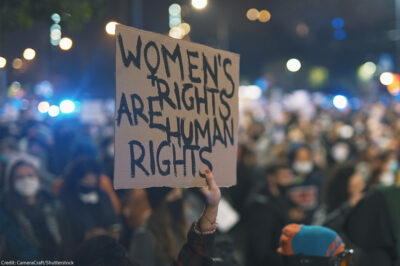ACLU Files Lawsuit on Behalf of Domestic Abuse Victim Who Was Evicted
FOR IMMEDIATE RELEASE
CONTACT: media@aclu.org
Mother of Two in Detroit Evicted After Ex-Boyfriend Violates a Personal Protection Order, Breaks into Her Home
DETROIT — The American Civil Liberties Union today filed a federal sex discrimination lawsuit against a Detroit landlord after the company evicted a domestic violence victim from her home. The management company has refused to revise a policy that evicts all tenants whose “guests” create a disturbance or damage the property, including tenants who are victims of domestic violence.
“We have seen time and time again that evictions of domestic abuse victims are based on gender stereotypes that teach us that women who experience domestic violence must be allowing it to happen, “said Emily Martin, Deputy Director of the ACLU Women’s Rights Project. “It is time for the courts to step in and send a message to landlords that we will not stand by as they throw women out on the street because they are victims of domestic violence.”
Last year, Tanica Lewis ended a relationship with Reuben Thomas and obtained a personal protection order after he harassed and stalked her. She informed the management company of the order that prohibited Thomas from entering the property. On March 1, 2006, however, Thomas broke the windows to her home and kicked in her door. When Lewis learned of the vandalism, she immediately reported the incident to the police, as well as to the residential manager of the property. Thomas was ultimately convicted of home invasion and ordered to pay restitution for the damaged property.
Nonetheless, based on this incident, Management Systems Incorporated issued Lewis a 30-day notice of eviction on March 13, 2006, stating that she had violated a portion of her lease that said she would be liable for any damage resulting from lack of proper supervision of her guests. Lewis subsequently moved from the property in compliance with the notice to an apartment that cost $200 more per month and that was further from her job and the help of a family member who had been caring for her daughter during work hours, forcing her to make new childcare arrangements.
According to the lawsuit, filed today in U.S. District Court for the Eastern District of Michigan in Detroit, the policy of evicting domestic violence victims constitutes sex discrimination in violation of the federal Fair Housing Act and Michigan’s Civil Rights Act. According to legal papers, the policy relies on outdated gender stereotypes and disproportionately impacts women who are eight times more likely then men to be victims of domestic violence.
In January 2007, the ACLU wrote letter on Lewis’ behalf to Management Systems asking that that the company make an apartment available to her family comparable in cost, amenities and location to the unit from which they were evicted and to reimburse her for financial damages incurred by the eviction. The company, however, did not respond.
“All too often women are victimized twice – first by an abuser and again by a landlord,” said Kary Moss, Executive Director of the ACLU of Michigan. “This has happened before in Michigan but we have been able to negotiate new policies. In this case, however, we have not been successful and are now filing this litigation.”
Over the years, the ACLU has successfully challenged similar policies across the country. In another case in Michigan, the Ypsilanti Housing Commission (YHC) agreed, after the ACLU intervened, to end a policy that led to the eviction of Aaronica Warren, a domestic violence victim. The YHC had relied on a “one-strike rule” in its lease that permitted it to evict tenants if there was any violence in a tenant’s apartment – even if the tenant was the victim of the violence.
In addition, after the ACLU became involved, a federal court in Vermont issued a first-of-its-kind ruling in Bouley v. Young-Sabourin in 2005 holding that discriminating against victims of domestic violence constitutes sex discrimination under the Fair Housing Act. The judge ruled that when a landlord seeks to evict a tenant immediately after she has been the victim of a domestic assault, the protection the Fair Housing Act provides against sex discrimination is applicable.
Lewis is represented by Martin and Lenora M. Lapidus of the ACLU Women’s Rights Project, and Moss and Michael J. Steinberg, and Kary Moss of the ACLU of Michigan.
The letter sent to Management Systems Incorporated is available online at: www.aclumich.org/tanicalewisletter.pdf
The complaint is available online at: http://aclumich.org/pdf/lewisevictioncomplaint.pdf
Stay Informed
Every month, you'll receive regular roundups of the most important civil rights and civil liberties developments. Remember: a well-informed citizenry is the best defense against tyranny.



